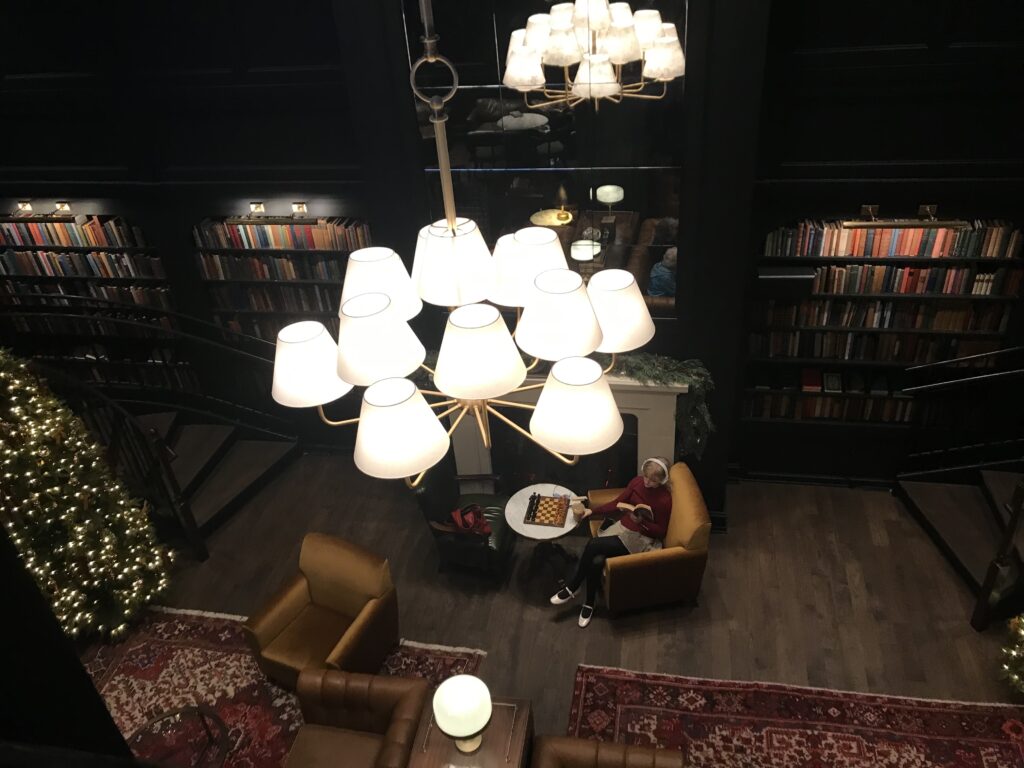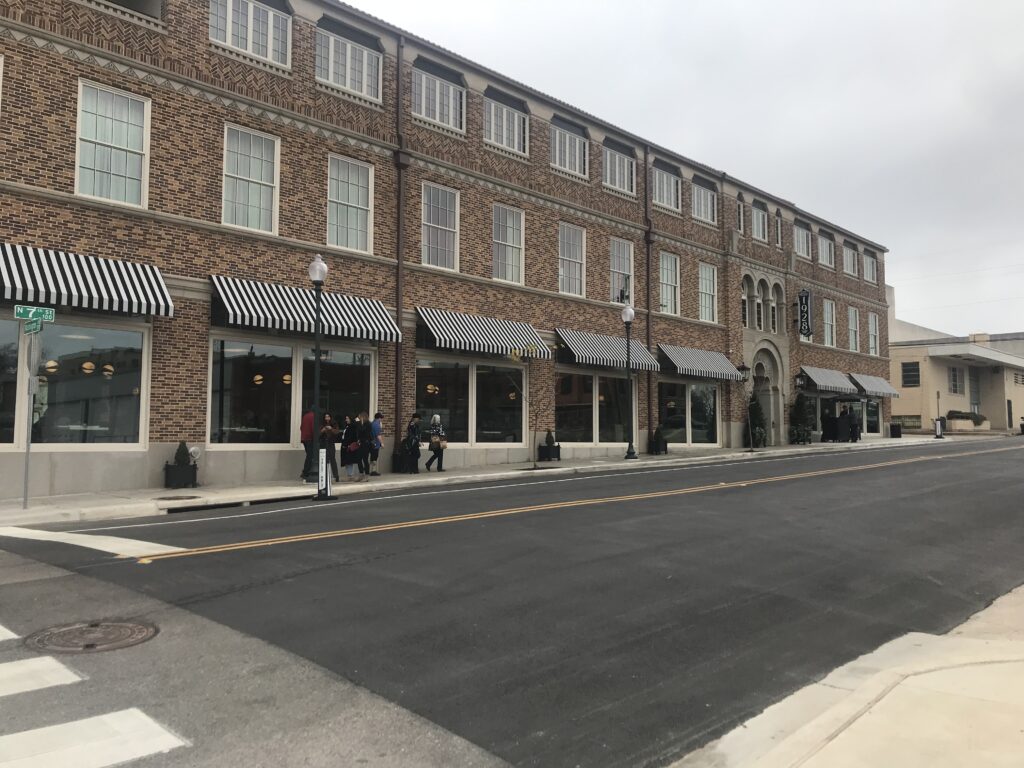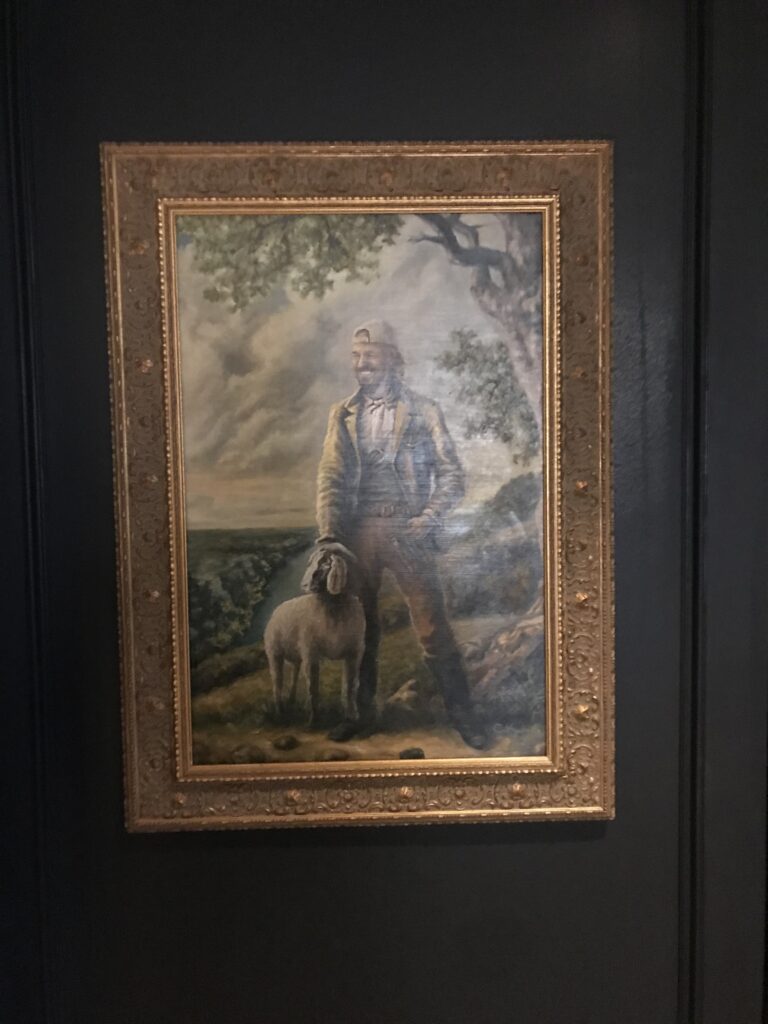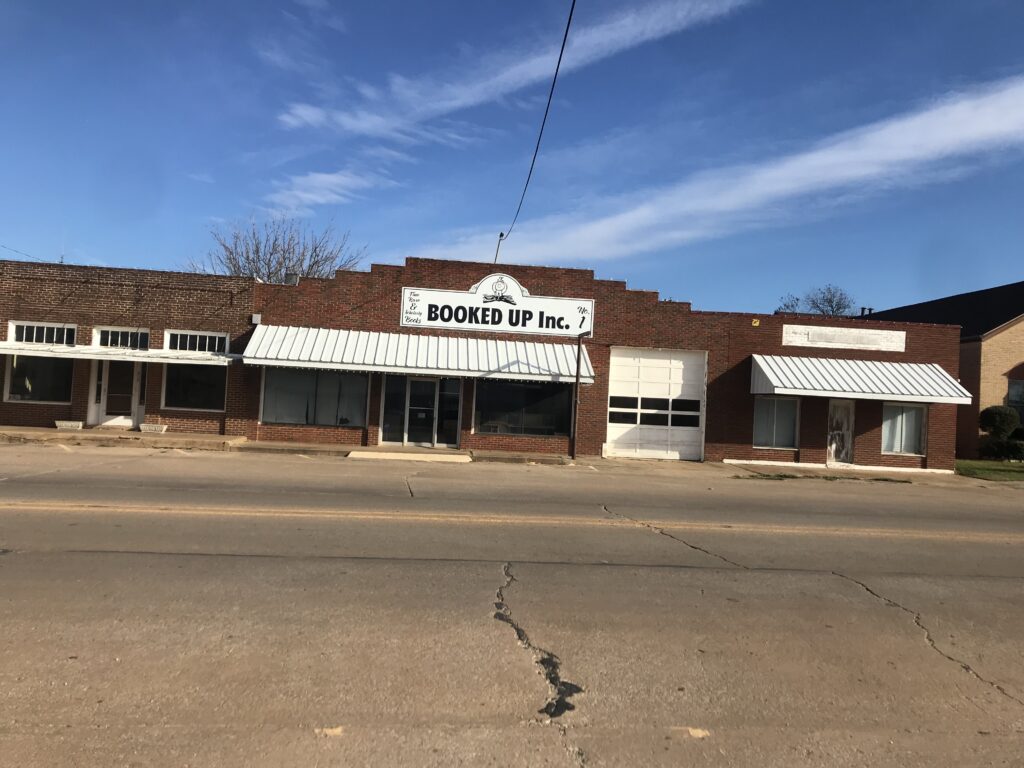
Photograph by Colin Ainsworth.
Everybody in the the New Wave–nostalgia hotel has their phones out, which makes me pretty much like everybody else. After breezing past the lobby desk, I peek around: slate colors, fresh leather. There are scented candles burning somewhere. There’s a coffee bar selling things at New York prices, and while I wait for what will be a bitter, strong, iced $5.50 Americano, I see them: maybe 1,500 antique books, lined up in a custom black bookcase that’s about twenty feet tall.
In their latest show, Fixer Upper: The Hotel, the home-and-lifestyle reality stars Joanna and Chip Gaines renovate and redesign the Karem Hotel in downtown Waco, Texas, into what they name the Hotel 1928. (The original hotel was built in 1928.) The Gaines family struck gold in the 2010s with their house-flipping show Fixer Upper, and they eventually outgrew HGTV to form their own network, Magnolia. What’s not to like about the duo? Joanna Gaines looks like a movie star, and she’s unreasonably charming. And Chip is a dang goofball! Their dynamic onscreen is instantly recognizable, harkening back to classic sitcom marriages—loud, foolish husbands with extraordinary wives. Joanna barely bats an eye when Chip shows up in the first episode in a bellboy uniform just for some fun. The pair decided that their hotel lobby needed a library, and upon Joanna’s request for “a ton of books,” Chip purchased around 300,000, the entire collection of Larry McMurtry, the Texan writer who died in 2021. McMurtry spent a lifetime collecting books—more time collecting than writing, even. He opened a used-and-rare bookstore called Booked Up in Washington, D.C., in 1971; by the eighties, he had amassed enough books to outpace Georgetown real estate and expanded to stores in several cities out West. In 1986, he opened several locations of Booked Up in Archer City, Texas, where he eventually condensed his vast collection.
Chip Gaines’s parents grew up in Archer City as well. In the third episode of Fixer Upper: The Hotel, Chip takes Joanna on a roadtrip to take a look at the books. In a tone just this side of menacing, he says to Joanna, “We’re gonna see … this amazing bookstore that I bought,” a combination of understatement and confession. (Gaines purchased both the books and the two remaining storefronts in Archer City.)
After some standard husband-wife “Babe, what did you do” dialogue, Joanna concludes, as she wanders the stacks and stacks of the store, “I think this is the coolest thing you’ve ever bought in your entire life.”

Photograph by Colin Ainsworth.
And so these books would eventually come to Waco. When I talk about Waco with people from outside of Texas, they recognize the name from the siege of 1993, when FBI agents stood off against David Koresh’s cult at their compound for fifty-one days and dozens of cult members were killed in a fire. My own memory of Waco is colored by the two Baylor University athletic scandals of my childhood: the murder of a varsity basketball player by one of his teammates, and the systematic cover-up of multiple cases of sexual assault by the university’s then football coach, Art Briles. Today, thanks to Chip, Joanna, Fixer Upper, and the Magnolia network at large, people now fly into Austin to drive to Waco to see the Magnolia silos, shop at Magnolia Market, and wait in long lines to peer at various flipped houses in and around town. Something I cannot overstate: the flipped houses are just houses. The stores are filled with Magnolia products, sure, but the products are just used to stage the houses Chip and Joanna flip. Washed-out, Instagram-friendly dishware, gold-plated mirrors, dark wooden furniture that would clash only with light wooden furniture, all of it is of the same piece—boho, modern farmhouse, Southern chic, a revolution in style and decor, whatever you want to call it. And yet people come from all over the world simply to see these things, and then find themselves in Waco, Texas, which is still, more than anything, just on the way to the next city.
I stop in Waco en route from Austin to Dallas, curious to see the hotel and to check in on McMurtry’s books. It’s two days before Christmas, and downtown Waco is as dead as it’s ever been. There’s vacancy at the Hotel 1928, but there will be none in a week, on New Year’s Eve. Inside, away from the ghost town and the parking lots, old people and millennials waltz through the historic-turned-new hotel holding up their phone cameras. I can’t really tell who’s staying here and who’s just passing through like me—sightseeing, maybe stopping by in hopes of grabbing lunch at the rooftop restaurant, where, I discover, there’s a three-hour wait for a table. (A rooftop, one has to wonder, overlooking what?)
The library is tucked away on the bottom floor: two symmetrical staircases descending from the ground level, dim lighting, plenty of deep armchairs and couches for theoretical reading. The books on the shelves are primarily antiques. In the show, upon her visit to Booked Up, Joanna clarifies that she’s less interested in the books from the past few decades. “For the hotel, I want the antique style … these are like, seventies, eighties, nineties. Those are early 1900s, and that’s what I want for the hotel.” She goes on. “The vision,” she says, for the library, is decidedly “darker, moodier.” She does a good job for the camera, performing the appropriate level of awe at the sheer mass of the collection, but she makes it clear to the audience, and to Chip, that what she needs out of McMurtry’s collection is simply eight thousand old-looking books.
There’s a handful of people lounging around the hotel. There’s another bookcase in the back corner, and a small desk with one of McMurtry’s typewriters and a plaque commemorating the collection in the opposite corner. There’s a sign imploring people not to touch the typewriter, which I feel cosmically extends to the books, so I just sit for a while on one of the leather couches. This is, I realize, the paradox of antique books generally—the fear of touching them, of disturbing the museum, which seems to preclude the notion of reading and of books altogether.
In his book Books, McMurtry details his long life as a book collector and seller. He coins his own term, bookman, one that reminds me of my grandfather, who had his own collection and rare-books business after he retired, primarily focusing on books about West Texas. My grandfather would go to book shows around Texas, and he’d sell some, but he’d always buy more, never putting any real money together; this seemed to be the general practice of all the old Texas bookmen at these convention centers. McMurtry describes buying full collections, too, often sight unseen, but he also notes that even those purchases can be long and emotionally tangled for both buyer and seller. “Sometimes, frustrating as it is for the bookseller,” he writes, “it can be a long while before a collector—or his or her children or grandchildren—decides to let the books go. And whether the offer is a thousand dollars or a hundred thousand, money is seldom really the decisive factor in a purchase of long-held books. The drama of release belongs to the owner, and it can involve a long overture.”
The point, then—even if no money is really made, and it really isn’t, ever—is that the cycle continues. You could argue that what happened to McMurtry’s own collection was the more or less same. These books were for sale and someone bought them. But I think something fundamentally different is happening here: The books are ripped out of that bookselling economy, taken from Archer City and from the would-be customer, to achieve that darker, moodier tone Joanna was looking for.
In the library, I get as close to the shelves as I can and tilt my head to read the spines. There’s a copy of Moby-Dick just over the railing of the stairs. I look down over the library to see if taking it off the shelf is kosher. I don’t see anyone with a book, but I also don’t see any security or anyone telling me I’m about to do something wrong. I grab it and flip through it, still conscious that someone might be watching, and when I really realize that no one is paying attention, it occurs to me that I could walk out of this hotel with this book right now: Larry McMurtry’s personal copy of Moby-Dick, or at least, one from his bookstore, could be mine. I text a couple of friends this idea before I put the book back on the shelf.
Joanna said she needed eight thousand books for the library, but what’s here could only be two thousand, if that. I go to the gift shop and ask the clerk, Sharon, if she has any insight.
Sharon seems to be a native of Waco, or at least of this part of Texas. She’s an older woman with dyed hair and a loud voice. She asks me if I’m a local, and when I say that I’m from Austin she says that counts. When I mention the collection, she’s excited to talk. “They [Chip and Joanna] want you to take a book from the shelves, to sit for a while and read.” She says that when things are slower in the store, she does so herself. There are some books in the gift shop, though bizarrely none by McMurtry; I point out a book of Emily Dickinson poems above the crewneck sweaters, and Sharon says she’s grabbed that one often. “You know,” she says, “women weren’t authors back then.”
Sharon goes on to give me a fairly condensed history of the Gaineses’ work in the city of Waco. The flipped houses, the castle (“Oh, you haven’t seen the castle??”). She gives the party line about Chip being from Archer City, the sentimental value the collection has to him.
Where are the rest of the books? At the corporate offices, it turns out. “You wouldn’t believe how many books,” Sharon says. She describes the bookcases at the corporate offices as “basically as long as a city block,” and that they’re completely full. “You know,” she says, “they want to save history.”
On my way out, I’m greeted by the other art installation in the library: a portrait of one of history’s saviors … the white knight we apparently deserve.

Photograph by Colin Ainsworth.
A few days later, I went west from Dallas to Archer City. The drive there, like many in Texas, feels like watching the the American city dissolve. Further and further out, less and less around, the Texas countryside coming more and more into focus. McMurtry, I would argue, is concerned with leaving Texas, and then returning: Woodrow Call’s long trek back from Montana in Lonesome Dove; Danny Deck’s deathless drive back from California in All My Friends Are Going to Be Strangers; the return of Emma’s children to Houston in Terms of Endearment. All of which recalls McMurtry’s own departure from and eventual return to Archer City.
When I arrive, as I come upon the single stoplight in town, I first notice the theater, familiar from Peter Bogdanovich’s The Last Picture Show, which was based on one of McMurtry’s novels. The town is deserted. There’s a closed visitor center with brochures on a magazine stand outside that look like they’re twenty-plus years old.
I make a quick detour to try to visit McMurtry’s house, which is unmarked, using a twenty-year-old Architectural Digest article as my guide. The green roofing, the portico design, the cracked driveway, and the numerous add-ons come together to feel like a West Texas castle, one that wouldn’t take kindly to Fixer Upper finishing touches. It’s adjacent to a country club. I walk onto the putting green to try to get a closer look when a man practicing his chip shots asks if I’m looking for the porta potty. “No, I’m just out for a walk!”
I drive around the corner to the Dairy Queen that McMurtry apparently frequented. There’s a booth with a few plaques commemorating his work and legacy. There is something more lively in this display than in the entirety of the Magnolia library with its books sitting idle. Wow, I think before I scarf down a Reese’s Blizzard and get back in the car, this is where he ate ice cream. There’s a certain aimlessness to all this looking for McMurtry that seems akin to his work. A genuine Texas phenomenon: to stand directionless in a town and wonder how to make your way out.

Photograph by Colin Ainsworth.
I make my way, finally, to Booked Up, which is just down the block from the single stoplight, in the center of town. There’s only so many places it can be. Booked Up used to take up even more square footage, some three or four storefronts, and a hundred thousand more books. Today, there’s just Booked Up No. 1 and No. 2, across the street from each other. Both are locked and have been since McMurtry died in 2021; you have to wonder, for all the Gaines’ famous fixing-up, about what will become of these still-empty storefronts. I can peek through the window to see that Booked Up No. 1 looks as if it’s been robbed. There are tables, chairs, and shelves all empty and dusty. It’s a strange terrarium, a ravaged-then-untouched wasteland. The shelves in Booked Up No. 2, though, are half-full, half-empty. I can barely make out what any of the spines on the books say, but there are thousands in there, abandoned or, I suppose, waiting to be saved. I push one of the doors, just to see, and it doesn’t open.
Colin Ainsworth is a writer who lives in Brooklyn.
from The Paris Review https://ift.tt/Ef2QuzW
Comments
Post a Comment